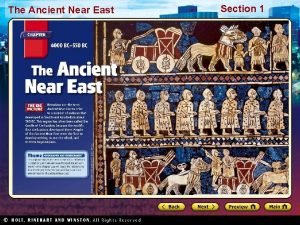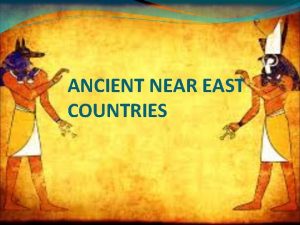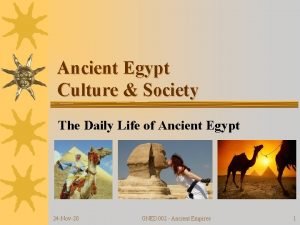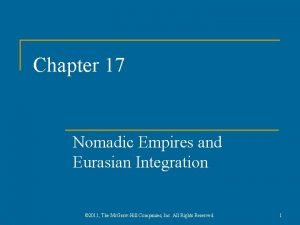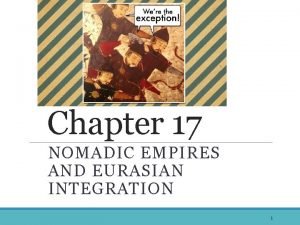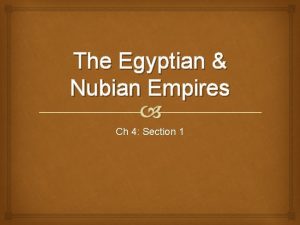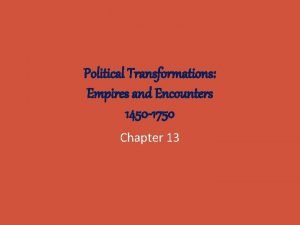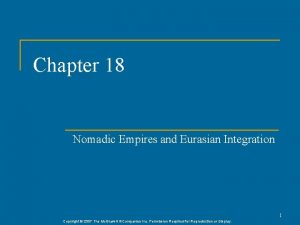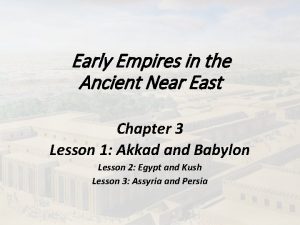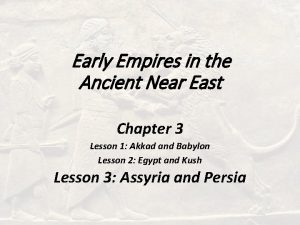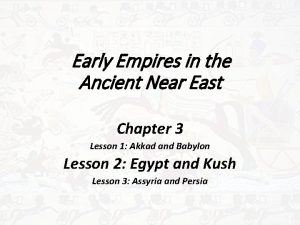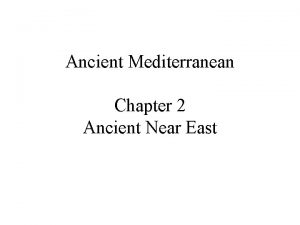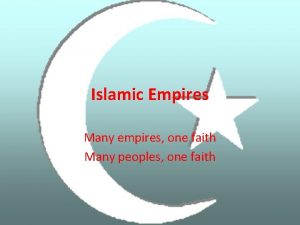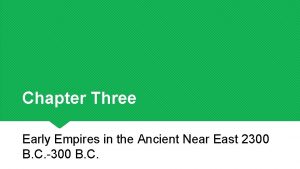CHAPTER 2 ANCIENT NEAR EAST PEOPLES AND EMPIRES














- Slides: 14

CHAPTER 2 ANCIENT NEAR EAST: PEOPLES AND EMPIRES

THE HEBREWS • Semitic-speaking people whose tradition was recorded in the Old Testament • Descendants of Abraham moved from Mesopotamia to Palestine • Known afterwards as “Children of Israel” • Drought in Palestine drove many Israelites to Egypt • where they lived well until pharaohs drove them into slavery until Moses led them out of Egypt • Between 1200 -1000 BC, the Israelites established themselves as a distinct people and established a kingdom • Saul was 1 st king of the Israelites (1020 -1000 BC) • His kingdom was destroyed after disastrous struggle w/ the Philistines, the tribes broke up • David (1000 -970 BC) reunited the tribes, defeated the Philistines and established control over all of Palestine

• David’s son, Solomon (ruled 970930 BC) did even more to strengthen royal power • Best known for building projects (the Temple in Jerusalem) • The Temple was the spiritual & political center of the kingdom • Reportedly housed the Ark of the Covenant • After Solomon’s death, the kingdom divided into 2 nations: the 10 northern tribes remained the kingdom of Israel, 2 southern tribes became kingdom of Judah

• By the end of the 9 th century BC, Israel was paying tribute to the Assyrian empire. • By 720 BC, the capital was destroyed and the Israelites were dispersed throughout the Assyrian empire • Judah paid tribute to Assyria, but remained independent • When Nebuchadnezzar II’s Chaldean Empire conquered Judah, Jerusalem was completely destroyed (586 BC) • Many upper-class of Judah were sent to Babylonia in exile (the Babylonian Captivity) • By 538 BC, the Persians had conquered the Chaldean Empire & the Israelites returned home & rebuilt Jerusalem • Remained under Persian control until Alexander the Great’s conquest of Persia around 333 BC • Judah survived, the people became know as Jews and their religion was know as Judaism

SPIRITUALITY OF ISRAEL • Yahweh was the chief god of Israel; though many worshiped other gods as well • Babylonian exiles, in the 6 th cent BC, were the first to accept Yahweh (the God of Israel) as the only God • Chief source of information about spiritual conceptions in Israel is the Hebrew Bible • Focuses on one basic theme: necessity of Jews to obey God’s law • The Prophets (p. 35 -36)

FAMILY & MARRIAGE • Family was patriarchal • Husband was master of his wife and possessed power (including life and death) over his children • One household could contain husband, wife, married sons & their wives and children under one roof • Kings were limited to 18 wives and citizens to 4 • Only kings could afford a large harem • Women were highly valued, but seen as servants of father or husband • Marriages arranged, but Hebrews did not use dowries • The groom actually paid the bride’s father (presumably for the loss of a daughter) • Sons were prized over daughters b/c daughters would leave the home.

NEIGHBORS OF THE ISRAELITES • The Philistines attacked from the sea and had five cities established on the Med. Coast • They settled as farmers and eventually came into conflict w the Israelites • The Phoenicians were another semitic-speaking people • Best known as transmitters • Most famous settlement was • Written language not pictographs like Carthage in North Africa earlier civs. • used 22 signs to represent sounds of their speech • spelled out all words in their lang. • Passed on to Greeks

THE ASSYRIAN EMPIRE

• The Assyrian Empire rose as the Hittites were destroyed and the Egyptian civilization was in decline • Although part of Mesopotamia, Assyria had a different terrain and climate • Expanded in large part due to its brutal military methods and violent suppression of internal revolts. • Eventually overthrown by Chaldeans in Bablyonia.

THE NEO-BABYLONIAN EMPIRE • Nebuchadnezzar II (605 -562 BC) defeated the Assyrians • Under his rule, the Chaldeans conquered Egypt, Syria, & Palestine • Destroyed Jerusalem, began the Babylonian captivity • Great builder, responsible for the Ishtar Gate & the Hanging Gardens (one of the 7 wonders) • The last king, Nabonidus, was so • Chaldean power was short-lived; hated; Babylonians Babylon conquered by Persians in 539 welcomed the Persian BC invaders as liberators

THE PERSIAN EMPIRE • Persians were Indo-European-speaking people of southern Iran (nomads from the area of Persis) • They gain prominence under King Cyrus in 500 s BC-had largest and strongest empire to that time. Wise and capable. • Allowed Jews to return to Jerusalem after capturing Babylon. • Had a respect for ancient civilizations as well, borrowing building techniques, traditions, etc. that may be of use.


EXPANDING THE EMPIRE • Darius (521 -486 BC) strengthened empire even more, • Codifies Egyptian law • Builds a canal to connect the Red & Mediterranean Seas • Extended his eastern border to the Indus River • Advanced into Europe by making the Macedonian king a vassal • Revolt in the Greek Ionian city-states leads him to invade Geece • The invasion of Greece failed, culminating w/ the Athenian victory at Battle of Marathon

Persian Religion • Zoroastrianism • Zoroaster-prophet- did not introduce a new god, but introduced the thought that Ahuramazda was the only good God • Ahuramazda had qualities that all humans should to (good though, right, & piety) • Right is opposed by the lie, truth by falsehood, life by death • The good of Ahuramazda was countered by the evil spirit of Ahriman • Zoroastrianism seems to have many similarities to basic Christian beliefs
 Early empires in the ancient near east
Early empires in the ancient near east Laissez faire theory
Laissez faire theory Maritime empires vs land empires
Maritime empires vs land empires The ancient near east
The ancient near east Ancient near east countries
Ancient near east countries Physical education in primitive society
Physical education in primitive society Ancient empires jar
Ancient empires jar Classical brigade system
Classical brigade system Leverage flag in football
Leverage flag in football East is east and west is west
East is east and west is west Chapter 17 nomadic empires and eurasian integration
Chapter 17 nomadic empires and eurasian integration Chapter 17 nomadic empires and eurasian integration
Chapter 17 nomadic empires and eurasian integration Chapter 4 section 1 the egyptian and nubian empires
Chapter 4 section 1 the egyptian and nubian empires Chapter 5 political transformations empires and encounters
Chapter 5 political transformations empires and encounters Chapter 18 nomadic empires and eurasian integration
Chapter 18 nomadic empires and eurasian integration



